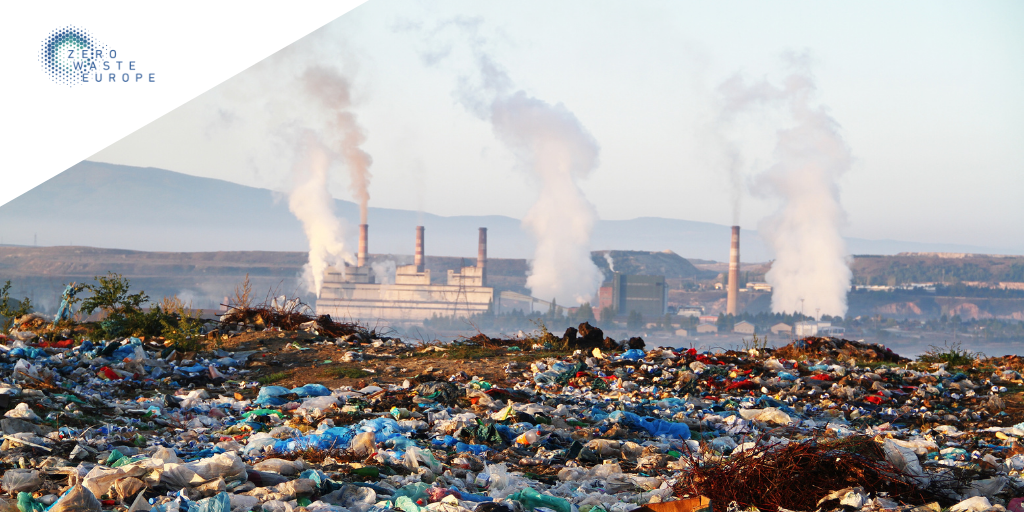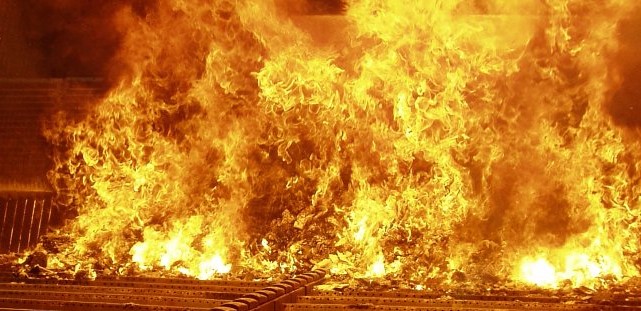‘Waste’d Opportunity
At a Council meeting on the 11th of August elected members from the SNP, Labour and Conservative groups voted to accept two contradictory council papers. One was designed to highlight the ongoing Climate Emergency and develop plans for ”be the future” to help battle it. The other paper was to allow Council Officers to tie the people of Clackmannanshire into a 10 – 15 year contract for burning our rubbish in an incinerator designed to generate electricity while releasing Carbon Dioxide into the atmosphere, an action that will of course worsen the Climate Emergency and pollute the environment at the same time. Luckily for the people of Clackmannanshire at least we won’t be burning our waste on our own doorstep; we will be sending it to a neighbouring Local Authority area and polluting their air and environment instead. At a time when the Scottish Government have just published reports indicating the best way of dealing with waste is not to have any, that increased use of incineration is likely to lessen the effectiveness of energy creation from burning waste, recommending that no new incinerators should therefore be built and that local authorities should do everything they can to avoid getting into lengthy contracts for waste incineration, it is somewhat worrying that no other options were presented to, or have been considered by Clackmannanshire Councillors.
The Clackmannanshire UNISON branch has for several years
asked officers of the council to discuss with the trade unions a plan for
increasing recycling and alternatives for waste other than incineration. We
firmly believe that Clackmannanshire Council could be creating local, sustainable
jobs from income generated by waste streams providing low cost heat and
electricity from waste but without damaging the environment while doing so.
At the meeting on the 11th August only local Green Councillor Bryan
Quinn chose not to hold the contradictory position of both voting in measures
to help deal with the climate emergency on one hand while voting in measures
that will worsen it with the other. It should be noted that he also
attempted to submit an emergency motion to the Council meeting to show support
for trade unions and their members for taking action to secure fair pay.
However UNISON understands this was refused. Apparently showing support for
workers fighting for a fair pay award is not something those running
Clackmannanshire Council consider competent for a Council Meeting.
UNISON felt that our elected members should have taken steps that are more
aligned with our own ambitions in order to protect the planet, the people of
Clackmannanshire and our neighbours. This vote demonstrates that, much like the
outcomes from the COP26 conference on climate change, there is no real political
ambition to turn the tide on global warming. Politicians like to say the right
things on climate change while also voting for policies that will ultimately accelerate
the rate at which our planet is severely damaged. For UNISON this is yet
another wasted opportunity where Clackmannanshire Council could have led the
way on climate change and created a real circular economy, something which
could have assisted with the current challenges we are all facing with the cost
of living crisis.
The Scottish Government currently bans Councils from putting household biodegradable waste (garden waste, food, cardboard etc) into landfill as this is the waste that generates methane gas which is 25 times more damaging to the environment than carbon dioxide. In 2025 this landfill ban on biodegradable waste will also apply to all other waste collected by local councils. Those with a sustainable vision of the future would see a waste stream that could create income through the collection of the methane to generate electricity while the heat generated from decomposition could be used to heat our buildings or homes. Unlike incineration the final by-product of this waste disposal process is not harmful C02 emissions but compost, which again could be used locally as it is in other Council areas. It should be noted that the Scottish Government are also considering charging councils an additional fee if they incinerate waste, a cost that is not yet factored into proposed council budgets for the coming years.
If you don’t bury your waste in landfill and you don’t
burn your waste in an incinerator then you only have one option left. You
recycle everything. This is the goal of the Scottish Government as well as all
sensible people everywhere on planet earth. The circular economy. Whatever goes
in, comes out. Almost nothing is wasted.
Instead of spending millions of pounds to incinerate waste we could have
invested in plants and technology designed to recycle the vast majority of our
waste stream. This could have led to the creation of jobs, businesses and a
whole new green revolution to develop the Wee County. Is that feasible or is it
just a pipedream? Well, we’ll never know, at least not for 10 – 15 years.
Despite council officers planning for waste incineration for the better part of
4 or 5 years UNISON has seen no attempt by council officers to look at any
alternatives. UNISON has spoken to many councillors in recent weeks and none
were able to say what alternative options they had seen or considered. UNISON believes
that the Wee County can lead the way with a political ambition that does not
have to come from Westminster or Holyrood but can emanate from Kilncraigs! The people of Clackmannanshire know that
every possible measure must be taken to combat climate change, and we strongly
believe that our local politicians can take the right action to protect our children’s
futures. The meeting on the 11th
August was a blow to us achieving our ambitions however we believe that our
Councillors still have time to reconsider their position and demand alternative
proposals from council officers so that when they call something a ‘climate
emergency’ they also acknowledge they must take whatever steps are necessary to
deal with it.
UNISON will continue to press local councillors and council officers to limit the term of any waste incineration contract signed by Clackmannanshire Council. We will also push for new jobs and industries to be created around recycling and waste collection. We would urge our members to reach out to their Councillors, MP’s and MSP’s and demand action. Clackmannanshire can have the ambition and the vision to create local wealth and sustainability that leads the way to a better future.
Let’s not waste any more opportunities and work together for our common good.

image taken from Zero Waste Europe page. see link here
Concerns over Waste Incineration
Clackmannanshire UNISON branch are very concerned by 11 (1) new incinerators under construction in Scotland, 2 of which are located in our neighbouring authorities Fife, near Loch Leven (2) and Falkirk, Grangemouth (3).

There is a marked increase in the public awareness and concern of the catastrophic consequences of Climate Change and the damage it will do to our planet. Children across the world have engaged in strike action in order to highlight their concerns and according to recent polls two thirds of the UK population now agree that the planet is in a climate emergency and it is worth noting that the Scottish Government has recently declared a Climate Emergency (4).
It was somewhat surprising to discover that over the course of the last eight years the Scottish Government has embarked upon a direction of travel to market waste as a means to meet the renewable energy generation targets through burning methane and incinerating landfill. While burning methane may be a reasonable Climate Change strategy, waste incineration is not and it should not be called ‘Green’ or ‘Renewable Energy’ as it produces more Carbon Dioxide and air pollution when compared to burning fossil fuels. In addition Clackmannanshire UNISON believes that a reduction in funding to Councils has resulted in a direct reduction in recycling for items like glass and garden waste.
Climate Change (Scotland Act) 2009 (5) places a duty on local authorities to contribute to the delivery of emissions reduction targets. As local authorities are moving towards the incineration of waste regardless it would appear that this act is merely an inconvenience which can be disregarded. Nordic block countries who were among the first to use incinerators are now being encouraged by Zero Waste Europe (6) to reduce or stop the use of incinerators.
Climate Change (Scotland
Act) 2009[1]
places a duty on local authorities to contribute to the delivery of emissions
reduction targets. As local authorities are moving towards the incineration of
waste regardless, it would appear that this act is merely an inconvenience
which can be disregarded. Countries in the Nordic Block who are considered
leaders in developed waste have an over reliance on incineration which has
prevented them from meeting their climate change targets and Zero Waste Europe[2]
is urging them to reduce or stop their use of incinerators.
[1] http://www.legislation.gov.uk/asp/2009/12/contents
[2] https://zerowasteeurope.eu/2019/08/nordic-countries-have-to-steer-away-from-incineration/
It is claimed that incineration is a smart way to create energy and dispose of waste at the same time, however as the process releases large amounts of Carbon Dioxide research has shown that this if far from a smart solution. Not only is incineration less desirable than recycling in terms of energy efficiency, profitability, job creation and flexibility, it also discourages efforts to recycle which retains valuable resources.
Incinerators are expensive to build, and to repay the investment they need to guarantee a waste stream which is mainly from Local Authorities. This acts as a disincentive for Local Authorities to enhance separate collection and recycling. As a result, it is typical for Local Authorities that utilise incineration to have lower recycling rates. It was also found in the UK that 51,400 jobs could be created by recycling 70% of waste collected by local authorities, 4700 of these jobs would be in Scotland.(7)
All of this begs the question why the Scottish Government thinks incinerating waste and releasing additional carbon into the atmosphere is a good idea.
Many Local Authorities have recently been discussing the potential to move to incinerating waste for electricity generation as a way of meeting their commitments to reduce using traditional landfill methods.
It is our opinion that it would be grossly irresponsible to move forward with a waste disposal method that increases Carbon Dioxide levels and accelerates Climate Change and if Local Authorities agree long term contracts to feed these incinerators they will be tied into their use for the foreseeable future. We fully understand that all Local Authorities now have a duty to phase out waste in landfill however we should be investing in processes and technologies which maximise recycling to reduce our carbon footprint rather than investing in outdated technology that will pollute our air with something which is almost worse than coal fired power stations.
Clackmannanshire UNISON branch are campaigning to oppose the incineration of waste and adopt an action plan that promotes a Circular Economy for Waste. The EU promotes a Circular Economy for waste (8) as too much waste is burnt in Europe. More than 80 million tons of waste is burnt in Europe every year and now Scotland is joining this outdated bandwagon with 11 new incinerators. Incinerators are incompatible with the aim of moving to Circular Economy’ e.g. where waste is prevented and products reused or recycled. The use of Incinerators to dispose of waste is also incompatible with anyone that seriously believes that we are in a climate emergency and must take action.
Clackmannanshire UNISON branch will be lobbying the Scottish Parliament to provide appropriate investment and encouragement to Local Authorities to deliver more environmentally friendly waste and recycling services that protect the planet and its limited resources.
Footnotes
(1) https://theferret.scot/waste-incinerators-scotland-health-recycling/
(2) https://www.heraldscotland.com/news/16833231.families-up-in-arms-over-incinerator-plan/
(3)https://www.heraldscotland.com/business_hq/17306576.new-grangemouth-incinerator-will-preventlandfilling-a-fifth-of-scotlands-annual-waste/
(4) https://www.gov.scot/publications/global-climate-emergency-scotlands-response-climate-changesecretary-roseanna-cunninghams-statement/
(5) http://www.legislation.gov.uk/asp/2009/12/contents
(6) https://zerowasteeurope.eu/2019/08/nordic-countries-have-to-steer-away-from-incineration/
(7) guardian.co.uk, Tuesday 14 September 2010. The report can be accessed at, http://www.foe.co.uk/resource/reports/jobs_recycling.pdf
(8) https://eur-lex.europa.eu/legal-content/EN/TXT/?uri=CELEX%3A52015DC0614
